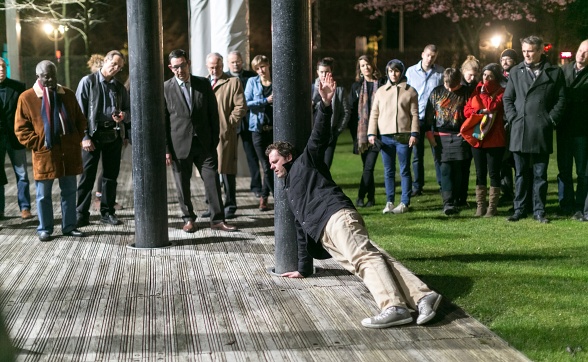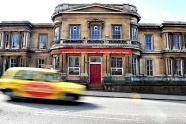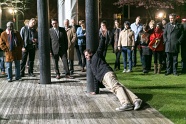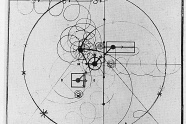
Jeremiah Day, Ghost Dance Song, 2012. (March 26, 2014 performance - Lower Saxony State Chancellery, Berlin) Photograph by Yorck Maecke.
Jeremiah Day, Ghost Dance Song, 2012. (March 26, 2014 performance - Lower Saxony State Chancellery, Berlin) Photograph by Yorck Maecke.
Performance Weekend
19 - 21 September 2014
Part of the 8th Liverpool Biennial Exhibition, The Companion is an experimental programme that brings together a group of artists for a few days in the city of Liverpool, after they have been intimately involved in conversation with one another for a few months or, in some cases, years. During their stay, the artists present ephemeral works informed and framed by time spent sharing space and meals while acting as counterpart and audience to each other, along with the public.
The Companion is inspired by the ancient symposium form, which consisted of a long dinner party punctuated by music and improvised commentary on a subject of shared interest. The project is conceived by Mai Abu ElDahab, Co-Curator of the Liverpool Biennial 2014 Exhibition, and artist and writer Angie Keefer (US).
The Companion performance weekend takes place at The Black-E, The Old Blind School, The Philharmonic Dining Rooms, Merseyside Dance Initiative, and The Kazimier with performances by more than 20 international artists.
Friday 19 September
Mounira Al Solh (LB/NL)
12-1.15pm & 4-5.15pm, Studio Room at The Old Blind School
Acousmatic Reading: NOA (Not Only Arabic Magazine) I & II
Audiences read NOA I (Treason is Like a Bible) and NOA II (Arrest Buried Under Something Else), two magazines that each exist as a single print edition, published following a series of politically-motivated arrests. Space is limited to 12 people per session. Free, booking required
Will Holder (UK)
9.30-10pm, The Philharmonic Dining Rooms
Last Futile Stab At Fun
Typographer Will Holder reads a metered lecture “to be sung or chanted”, written by American composer Robert Ashley. Free, booking required
Josephine Foster (US) and Victor Herrero (ES)
10-11pm, The Philharmonic Dining Rooms
Josephine Foster and Victor Herrero play a live vocal and acoustic set, channelling the spirit of collective anonymous music. Free, booking required
Saturday 20 September
Angie Keefer (US) and James English Leary (US) with The Companion participants and Biennial mediators
10am-4pm, Studio Room at The Old Blind School
The Screens
Artists and mediators produce segments of Jean Genet's play, The Screens, in an improvised film studio. Free, drop-in
Lucy Skaer (UK)
12-1pm, The Old Blind School exterior, Hope Street side
Obscurantism
Skaer conducts a partial tour at The Old Blind School from the outside, looking in, while using a series of objects cast in obsidian to reflect on the role of obscurantism in economics and other social systems. Free, no booking required.
Jeremiah Day (US) with Bart de Kroon (NL)
4pm, Merseyside Dance Initiative
Bagram, Kaiserslautern, Bethesda
The debut performance of Day's project tracing the legacy of the American Anti-Imperialist League, with music by Bart de Kroon. Free, booking required
The Companion at The Kazimier
7pm – Late, The Kazimier, £5
Hassan Khan (EG)
A short story based on a distant memory with a long musical interlude
A suspenseful story in pulp literary Arabic, an attempt to discover the work, the direct and abstract power of music, childhood memories, the driving anger one depends upon when writing, and the elusive search for simplicity.
C. Spencer Yeh (TW/US)
Solo Voice
Compositions and improvisations using extended vocal techniques and electronics as a means to explore disembodiment and displacement of sound from voice and language.
Chris Evans and Will Holder (UK)
Errors Hit Orient
Newspaper reviews of football matches, written by BS Johnson, set to musical accompaniment.
Federica Bueti (IT) and Jan Verwoert (DE)
Echo Echo Narcissus Narcissus
An attempt at inducing mutual metamorphosis with the help of words, echoes, glitter, and a pool.
Jaxson Payne (UK)
Improvisation with electronic drum-kit and a vast bank of samples.
CONCERT - Chris Evans (UK), Morten Norbye Halvorsen (NO) and Benjamin Seror (FR)
Sentimental disco propped up by convoluted electronic drums, a reincarnated analogue bass, and the vocals of a self-styled chanteur.
Anika (DE/UK)
Political journalist turned singer-songwriter, Anika performs live her mix of trashy discordant post-punk.
DJs Shintaro Taketani and Oliver Baggott
Known for their disco pop and 80s synth sound, the DJs will play a vinyl set accompanied by the artists’ visuals.
Sunday 21 September
Christophe Wavelet (FR) with Darko Radosavljev (DE), Alma Toaspern (DE), Erik Eriksson (SE), Alex Neilson (UK)
2pm, The Black-E
Oskar Schlemmer Dances: RAUMTANZ, FORMENTANZ, GESTENTANZ (1926); STäBETANZ (1927); METALTANZ (1929)
Dancers and musicians stage works conceived by Oskar Schlemmer, originally presented by young artists who studied with him at the Bauhaus in Dessau. Free, booking required
To book tickets for The Companion, please visit the Events pages on the website.
Liverpool Biennial
55 New Bird Street
Liverpool L1 0BW
- T +44 (0)151 709 7444
- info@biennial.com
Liverpool Biennial is funded by
Founding Supporter
James Moores





















